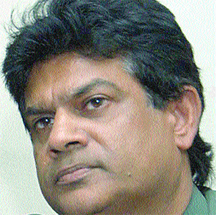(Trinidad Guardian) While discharging his responsibilities as Minister of Health, Dr Fuad Khan is counting the days when he would be quitting the cabinet position and return to his practice as one of the country’s few urologists. Dr Khan who says he is being emotionally pulled apart between his ministerial office and his duty to his patients, is putting systems in place so that his successor would be well placed to continue to run the affairs of the ministry in a satisfactory manner. One of the things he is doing in the meantime is to open up visiting hours at the nation’s public health institutions instead of this being done at appointed designated hours.

Q: Dr Khan many moons ago when he was Minister of Health Kamaluddin Mohammed told me that the Ministry of Health was like a mad house and if he couldn’t fix the problems in the health sector no other minister could do it. Are you up to that task today?
A: (Smiling at his Park Street, Port-of-Spain, office Wednesday afternoon) Well, maybe in the 70’s it was a mad house right? I was too young to find out. However, because of the work that he and others before me did I have inherited something that’s not a mad house. So I want to thank them for creating and putting the effort to reach where we are today.
You know that statement runs counter to the negative perception that many have of the public health sector in terms of prompt and adequate health care delivery?
Remember Clevon our health care system caters to a very large segment of the population; the private sector caters to a much smaller clientele who pay for their services and having to serve the majority of the population you will find that there will be snags in the public sector. I am not making a self-serving defense of the system but the facts must be faced. There are two things we must take into consideration, people don’t like to wait and two, they believe their illness is more urgent than somebody else’s but in the health system there is something called the triage system.
Which is?
This is determining the extent of their illness by a simple observation, so that some people might feel another person is getting in before them and so on. I am not saying the health sector is not without fault, it could be upgraded…
Being a medical professional yourself what are some of the major problems facing the public health system?
There is not much penalty for inefficient performance.
Are there any penalties at all?
The American system which I like to quote if you don’t produce you go. In our system however, sometimes you could lie down very quietly you don’t produce and …
Get paid?
Yes and they get promoted. We tend to promote in this system people who they want to get rid off. In the other system people are promoted on merit, in our system you get promoted based on seniority so sometimes you don’t get the best person for the job.
How serious is what I deem indiscipline in the system…..how is this affecting the efficient delivery of health care?
(Furrowed brow) You see it is difficult to discipline people, and we have to look at other things too. If you have two or three doctors working in the emergency section and an urgent case should turn up they have to go and see about that case so that patients with less urgent problems would have to wait and I know that that could cause some frustration…
True but there have been cases where patients had to wait for very lengthy periods…five, six, eight hours…
I am not defending it but in the emergency system abroad the average waiting time is six to eight hours for non-urgent cases. But I have put a system at the Eric Williams Medical Sciences Complex and we will see how it works out, where patients will be put in a good room fairly comfortable, and will be told how long their waiting time would be. We are also opening a shuttle service to the St Joseph Health Centre so they could go there for the non-urgent cases where they will get a faster service using a red card. It is hoped that you should get attended to in one hour or even less than that time.
Dr Khan what about the situation where relatives of patients are not being told anything about the condition of their loved ones even when they ask?
(Leaning forward with one finger on his left cheek) And that is a serious problem of which I am working on and I have put in place what we call customer service representatives, ambassadors and so on. Their job is to liaise with the patients’ relatives telling them what exactly is taking place with respect to their treatment, every step of the way relatives will be told the status of their sick relatives. Another innovative step I will be introducing and I am using this interview to disclose it is that very soon relatives will be able to visit their ailing relatives at any time.





